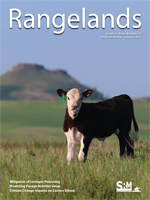On the Ground
Toxic larkspur (Delphinium species) cause large economic losses from cattle deaths, increased management costs, and reduced utilization of pastures and rangelands.
We recommend that you obtain a risk assessment for larkspur on your range before turning out the cattle. Submit samples to USDA–ARS Poisonous Plant Research Laboratory for chemical evaluation at no charge. Information is available at: http://www.ars.usda.gov/main/site_main.htm?modecode=54-28-20-00.
Selection of cattle resistant to larkspur poisoning could reduce cattle losses and improve rangeland utilization.
The use of genetic-based herd management decisions can provide a tool for livestock producers to improve their profit margin and enhance the economic sustainability of rural American communities.





